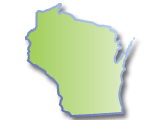Wisconsin Rebates and Incentives Summary

Wisconsin has relatively little sunlight. The state gets between 4 kilowatt hours of sunlight per square meter and 4.5 kWh per square meter per day, according to NREL. The state’s proximity to the Great Lakes and the dominant weather patterns, including persistent snow coverage in the winter and thunderstorms in the summer, are among the factors that reduce the amount of sunlight. Additionally, nearly half of the state is forested.
Wisconsin generates electricity through coal (60%), nuclear power (20%), and renewable sources (9%). The state’s electricity rates are below the national average, while its energy use is above the national average. The state’s per capita solar production ranks at 23rd in the nation.
While the state offers residents and businesses some incentives to convert to solar and renewable power, it offers more incentives to help people improve energy efficiency and increase insulation in their homes and businesses. Among the solar incentives offered in the state are a rebate program, various tax incentives, a loan-program, net metering and more.
To develop more locally-sourced power production, Wisconsin passed a renewable portfolio standard in 2006, requiring 10 percent of overall electric production in the state to be sourced from renewable resources. Under the law, utilities must purchase at least as much renewable energy as they bought in 2010, and must increase the amount purchased each year until 2015, when they reach 10 percent, and then they are not allowed to fall under that level of renewable power purchased. Thanks largely to investment in wind technology, Wisconsin utilities met this goal in 2013, and are forecasted to exceed it through 2020.
, basic_html
